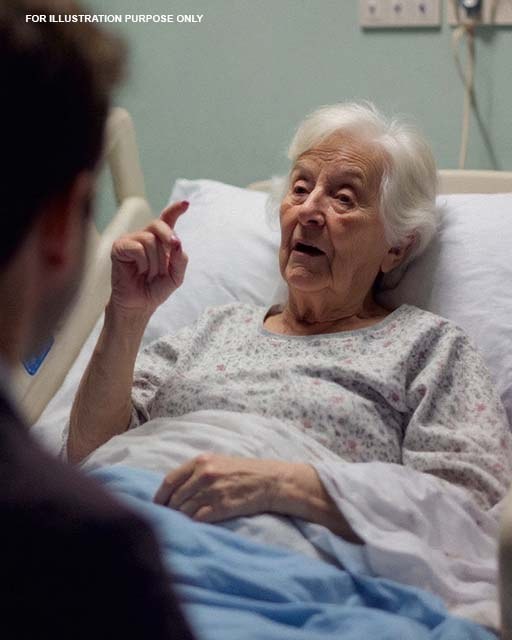That morning, when the doctor entered the waiting room, I assumed he would deliver the same vague update we’d been hearing for months—about waiting, monitoring, hoping. That had been our routine for nearly three months: tense, uncertain, exhausting. But this time, he looked directly at me, his expression softer than usual, and said something I never imagined hearing:
“She’s awake. Your mother is awake.”
For a moment, my mind went completely blank. Julia, my wife, squeezed my hand tightly, but I could barely process the words. She’s awake.
I ran down the hospital corridor, heart hammering, until I reached the ICU room. And there she was—my mother, Margaret, propped up against pillows, pale yet undeniably alive, her hazel eyes tracking my every movement.
“Mom,” I whispered, barely able to believe it. “You’re back.”
A faint smile trembled across her lips. “Hi, Oliver.”
Tears burned in my eyes as I kissed her forehead, overwhelmed with relief. For weeks, I had prayed for this moment, unsure if miracles still existed. My mother, the strongest woman I knew, had survived a devastating car accident that had left her in a coma the doctors said she might never wake from. And yet, she was here.
Julia entered hesitantly, coat clutched tightly. My mother’s eyes sharpened, and something unreadable flickered across her face. Not fatigue—something colder, sharper.
Assuming it was the disorientation of waking after months, I pulled a chair closer. “We’re so glad you’re awake. You scared us half to death.”
My mother’s gaze remained fixed on Julia. In a voice low and chillingly steady, she asked:
“How much longer were you planning to hide your secret from my son?”
The room went silent. Julia froze, her face paling, fingers digging into her coat sleeve.
“Mom,” I said softly, trying to calm the tension. “You’ve just woken up. You might be disoriented. What are you talking about?”
But my mother’s eyes never left Julia. “Don’t play dumb. I heard everything. Every word, every whisper, every confession you thought I couldn’t hear because I was immobile. I heard it all.”
I glanced between them, my chest tightening. Julia stammered: “She… she must be confused. Coma patients don’t… don’t hear, do they?”
My mother’s laugh was humorless. “You’d be surprised. Sometimes all you have is listening. And I listened to every poisonous word you spoke.”
Julia’s lips parted, but no sound came. The floor seemed to slip beneath me.
“Mom,” I pressed, “just tell me plainly. What did you hear?”
“I heard your wife talking to another man. On the phone. By my bedside, while you were getting coffee or talking to the nurses. I heard her say she couldn’t keep lying forever. That once I died, she’d finally be free. That she wished she could be with him instead.”
I staggered back, stunned. “What?”
Julia’s eyes widened in panic. “That’s not true! Oliver, you can’t believe this—she’s been unconscious for months, she’s confused!”
But my mother’s gaze was unwavering. “I remember dates. I remember details. I remember you whispering his name—Patrick. You told him you loved him.”
Patrick. My best friend since college. The man who had helped me through the darkest days of my mother’s coma. He had been there, steady, supportive, caring.
“Tell me it’s not true,” I whispered to Julia, voice breaking.
Her eyes avoided mine. “Oliver, please—your mother’s confused. She’s just come out of a coma. Don’t let her words guide you.”
But my mother’s confession had settled like stones in my chest. Strange moments I had dismissed—the secretive calls, Patrick’s unexpected visits, the tension in small interactions—they all began to make sense.
“Julia,” I said slowly, voice trembling, “did you cheat on me with Patrick?”
Tears welled in her eyes. Her silence was confirmation.
I sank into the chair, my world crumbling. That night, I could not sleep. I sat in the hospital parking lot for hours, staring at the ICU window, replaying every conversation, every laugh, every touch. Betrayal had a depth I’d never known.
Julia begged for forgiveness, but I couldn’t. She had chosen the most vulnerable moment of my life—when my mother hovered between life and death—to betray the two people I trusted most.
One evening, my mother reached for my hand. “You don’t have to thank me,” she said softly. “I didn’t do it to hurt you. I did it because you deserved to know. I lay here, forced to listen to lies. I swore if I woke, you wouldn’t live in them another day.”
Tears streamed down my face. “You saved me again, Mom.”
She smiled faintly. “No, Oliver. This time, I just gave you back your sight.”
Julia moved out, Patrick disappeared from my life, and the betrayal could not be undone. Yet through it all, my mother’s survival anchored me. The truth, though devastating, had freed me.
